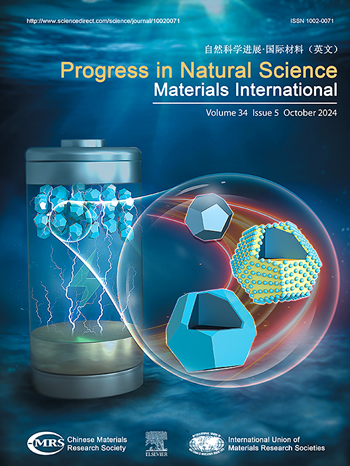Dimensional-noise-aware battery lifetime prediction via an EM-TLS framework
IF 7.1
2区 材料科学
Q2 MATERIALS SCIENCE, MULTIDISCIPLINARY
Progress in Natural Science: Materials International
Pub Date : 2025-02-01
DOI:10.1016/j.pnsc.2024.11.009
引用次数: 0
Abstract
Machine learning has been massively utilized to construct data-driven solutions for predicting the lifetime of rechargeable batteries in recent years, which project the physical measurements obtained during the early charging/discharging cycles to the remaining useful lifetime. While most existing techniques train the prediction model through minimizing the prediction error only, the errors associated with the physical measurements can also induce negative impact to the prediction accuracy. Although total-least-squares (TLS) regression has been applied to address this issue, it relies on the unrealistic assumption that the distributions of measurement errors on all input variables are equivalent, and cannot appropriately capture the practical characteristics of battery degradation. In order to tackle this challenge, this work intends to model the variations along different input dimensions, thereby improving the accuracy and robustness of battery lifetime prediction. In specific, we propose an innovative EM-TLS framework that enhances the TLS-based prediction to accommodate dimension-variate errors, while simultaneously investigating the distributions of them using expectation-maximization (EM). Experiments have been conducted to validate the proposed method based on the data of commercial Lithium-Ion batteries, where it reduces the prediction error by up to 29.9 % compared with conventional TLS. This demonstrates the immense potential of the proposed method for advancing the R&D of rechargeable batteries.
基于EM-TLS框架的维度噪声感知电池寿命预测
近年来,机器学习已被大量用于构建数据驱动型解决方案,以预测充电电池的使用寿命,从而将早期充电/放电周期中获得的物理测量结果预测为剩余的使用寿命。虽然大多数现有技术仅通过最小化预测误差来训练预测模型,但与物理测量相关的误差也会对预测精度产生负面影响。虽然已有人应用总最小二乘(TLS)回归法来解决这一问题,但该方法依赖于所有输入变量的测量误差分布均相等这一不切实际的假设,无法恰当地捕捉电池降解的实际特征。为了应对这一挑战,这项工作打算对不同输入维度的变化进行建模,从而提高电池寿命预测的准确性和鲁棒性。具体来说,我们提出了一种创新的 EM-TLS 框架,该框架增强了基于 TLS 的预测能力,以适应维度变量误差,同时使用期望最大化(EM)方法研究这些误差的分布。实验验证了基于商用锂离子电池数据的拟议方法,与传统 TLS 相比,该方法最多可减少 29.9% 的预测误差。这证明了所提出的方法在推动充电电池研发方面的巨大潜力。
本文章由计算机程序翻译,如有差异,请以英文原文为准。
求助全文
约1分钟内获得全文
求助全文
来源期刊
CiteScore
8.60
自引率
2.10%
发文量
2812
审稿时长
49 days
期刊介绍:
Progress in Natural Science: Materials International provides scientists and engineers throughout the world with a central vehicle for the exchange and dissemination of basic theoretical studies and applied research of advanced materials. The emphasis is placed on original research, both analytical and experimental, which is of permanent interest to engineers and scientists, covering all aspects of new materials and technologies, such as, energy and environmental materials; advanced structural materials; advanced transportation materials, functional and electronic materials; nano-scale and amorphous materials; health and biological materials; materials modeling and simulation; materials characterization; and so on. The latest research achievements and innovative papers in basic theoretical studies and applied research of material science will be carefully selected and promptly reported. Thus, the aim of this Journal is to serve the global materials science and technology community with the latest research findings.
As a service to readers, an international bibliography of recent publications in advanced materials is published bimonthly.

 求助内容:
求助内容: 应助结果提醒方式:
应助结果提醒方式:


